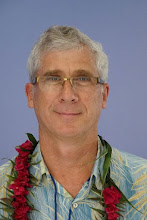"The question that lies at the heart of the debate we are considering is the question about the relation of particularity to universality. How can Gods' universal love be tied down to a particular set of events in history, events in Palestine and not in Japan or India or Africa? That is the scandal, the stumbling block that those who question the propriety of missions stumble upon. Why should God not speak his own word to every soul and to every culture?"
Bishop Lesslie Newbigin's lecture, "Mission in the World Today" was given to the New College Missionary Society, in the Martin Hall, New College, the University of Edinburgh, on November 12, 1987-almost a quarter of a century ago. I was priviledged to introduce Bishop Newbigin that evening, where the Missionary Society also named Newbigin the honorary president of the society.
I still have a copy of the typed address Bishop Newbigin sent to me-the words and thoughts seem as relevant as they did back in 1987, perhaps even more so now with the continued advance of secularism, syncretism and the cries for "unification" from many corners. "Mission in the World Today" has many flashpoints to our current political and religious situation. For example, the side discussions about pluralism, multiculturalism, and whether we need missionaries today or not, are points still argued today.
There are several themes which stand out to me in "Mission in the World Today". First, is how Newbigin's argument to his own pluralistic culture closely mirror the method the apostle Paul used with the Corinthian Church, and other churches. You will recall Paul's argues in 1 Corinthians 1:22-25 that God has presented Himself in a way (the suffering servant from Palestine) that few were expecting at the time- a living and breathing human being whom was crucified and died. The Greeks were seeking a philosophic and intellectual answer; whereas the Jews, were seeking a political solution. The presentation of Jesus, as a suffering God, was a "scandal" and a "stumbling block" for Greeks and Jews.
A high point of the address is the following section:
"As we well know-or at least as we here in Presbyterian Scotland ought to know-the heart of the biblical story is in God's choosing, God's election of one people among all the peoples, and finally of one man among all people, to be the hearer of the secret of his saving purpose for all. It is a secret because it contradicts human ideas about world dominion. A man nailed to a cross does not look like the one to unify the world. But it is an open secret because it has been entrusted to a community chosen for the purpose of being witnesses. And their witness is a witness to the resurrection of the crucified, to the fact that the final victory of God's love lies beyond death and beyond the dissolution of the cosmos."
Secondly, the church plays a significant role-a key role in the missionary enterprize. Newbigin's message is a giant kick in the pants to the Christian Church as well-get your story straight and keep on the message! The church consists of "witnesses" "to the resurrection of the crucified, to the fact that the final victory of God's love lies beyond death and beyond the dissolution of the cosmos." What I love best about this lecture, is how Newbigin challenges the church to regain her mojo-to have more courage in it's message to the secular world. As Newbigin notes, there is something deeply ironic that the Western world has no problem exporting science and techonology in the name of "world development" but then becomes strangely shy when the topic of religion and spirituality arises. Moreover, and perhaps most important of all, the church needs to stay on message and keep it's revelatory story "God's fatherly rule over all things and all peoples" at the forefront.
All excellent points, and points further developed in some of Newbigin's major works.
Looking back, I wish I could have spent more time with Bishop Newbigin, but I am grateful for having had the opporunity to meet him. He was obviously one of the great British theological giants along with Bishop Stephen Neill and the Ballie brothers. We would do well to read Newbign's books as they describe how the church can best move forward.
Sunday, March 25, 2012
Subscribe to:
Post Comments (Atom)




Thanks - I remember that Lecture very well and also the meeting at Nigel's afterwards.
ReplyDelete